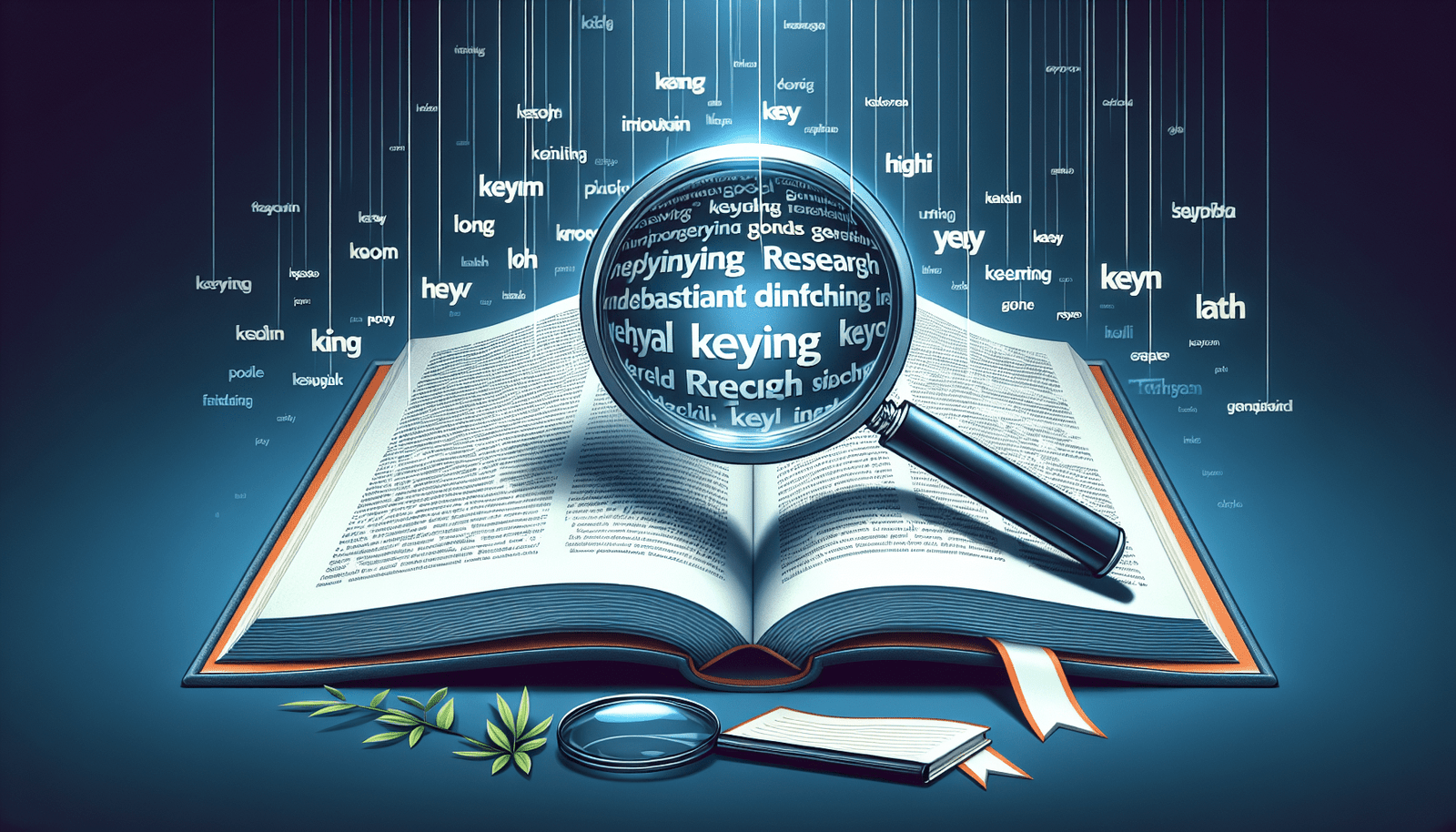Imagine transforming your book descriptions to attract more readers and boost your online presence effortlessly. In “How Can AI-Based Tools Revolutionize Your Book Descriptions for Maximum SEO Impact?”, you’ll discover how leveraging artificial intelligence can enhance your SEO strategy and make your book titles shine. By using AI-based tools, you can craft compelling, optimized descriptions that appeal to search engines and readers alike, giving your books the visibility they deserve. Dive in to learn how this innovative technology can take your book marketing to the next level.
How Can AI-Based Tools Revolutionize Your Book Descriptions for Maximum SEO Impact?
Have you ever wondered how AI can transform your book descriptions and make them SEO-friendly? If you’re an author or a digital marketer in the publishing industry, you likely know the immense value of well-crafted book descriptions. These blurbs do more than just introduce your book—they work as powerful tools to draw in readers and elevate your search engine rankings. But how do you achieve this magical blend of captivating prose and search engine optimization (SEO)?
In this article, we’ll dive into how AI-based tools can revolutionize your book descriptions for maximum SEO impact. We’ll explore the benefits and practical applications of AI, various tools available, and how to use them effectively to enhance your book’s visibility and appeal.
Why Book Descriptions Matter
Before delving into AI tools, let’s first understand the significance of book descriptions. A compelling book description does more than summarize the plot—it provides an emotional hook to engage the reader. Moreover, it can significantly influence your book’s discoverability on search engines like Google.
The Role of SEO in Book Descriptions
SEO is the process of optimizing your website content to rank higher in search engine results pages (SERPs). A well-optimized book description can enhance your book’s visibility, increasing the likelihood that potential readers will find it. Using relevant keywords, structured language, and persuasive writing are key components to achieving this.
Introduction to AI-Based Tools
Now let’s talk about how AI fits into this puzzle. AI, or Artificial Intelligence, refers to systems or machines that mimic human intelligence to perform tasks. In the context of book descriptions, AI can automate and optimize the process, incorporating SEO elements seamlessly.
Types of AI-Based Tools
Various AI-based tools can help you enhance your book descriptions. Here are a few categories to consider:
| Tool Type | Functionality |
|---|---|
| Text Generators | Automatically generate descriptive text |
| SEO Analyzers | Analyze and suggest SEO improvements |
| Keyword Tools | Identify relevant keywords |
| Sentiment Analysis | Gauge emotional impact of descriptions |
Each of these tools serves a different but complementary purpose. Let’s delve deeper into how each type can help transform your book descriptions.
Text Generators
Text generators use natural language processing (NLP) algorithms to produce human-like text based on given inputs. These tools can quickly generate various versions of a book description, saving you considerable time and effort.
How Text Generators Work
Text generators work by analyzing vast amounts of text data and learning the patterns within. When you input a brief summary or a few keywords, the AI generates relevant, coherent descriptions.
Benefits of Text Generators:
- Efficiency: Save time by producing multiple drafts quickly.
- Creativity: Get a variety of descriptions to choose from.
- Consistency: Maintain a uniform tone and style.
Popular Text Generators
- OpenAI’s GPT-3: Known for producing high-quality text.
- Copy.ai: Focuses on marketing copy, making it suitable for book descriptions.
- Jarvis (Now Jasper): Excels in generating creative content.
Example Usage
Imagine you’ve written a fantasy novel. You could input a brief summary of your book into a text generator, and it will produce multiple descriptions, incorporating relevant themes and keywords.
SEO Analyzers
While text generators help create the content, SEO analyzers ensure it’s optimized for search engines. These tools evaluate your text for SEO effectiveness and suggest improvements.
How SEO Analyzers Work
SEO analyzers scrutinize your text for various SEO factors, such as keyword density, readability, and meta description quality. They often provide a score or report, highlighting areas for improvement.
Benefits of SEO Analyzers:
- Insights: Gain actionable insights for SEO enhancement.
- Accuracy: Ensure your descriptions meet best SEO practices.
- Performance Tracking: Monitor the effectiveness of your SEO strategies.
Popular SEO Analyzers
- Yoast SEO: Widely used for content optimization.
- Moz Pro: Offers comprehensive SEO analysis.
- SEMrush: Provides detailed SEO audits and suggestions.
Example Usage
Let’s say you’ve generated a book description. Running it through an SEO analyzer can highlight areas where you can better incorporate keywords, improve readability, or adjust the meta description for higher impact.
Keyword Tools
Keywords are the backbone of SEO. Knowing which keywords to use in your book descriptions can dramatically improve your search engine rankings.
How Keyword Tools Work
Keyword tools help identify popular and relevant search terms related to your book’s genre, themes, and target audience. They often provide metrics like search volume, competition level, and trend data.
Benefits of Keyword Tools:
- Relevance: Choose the most effective keywords.
- Volume Data: Understand what potential readers are searching for.
- Competitive Edge: Gain insights into keyword competition.
Popular Keyword Tools
- Google Keyword Planner: Offers keyword ideas and search volume data.
- Ahrefs: Provides in-depth keyword analysis.
- Ubersuggest: Simple and effective for keyword research.
Example Usage
Suppose your book is a mystery novel. Using a keyword tool, you could find that phrases like “best mystery novels,” “crime thriller books,” and “detective stories” are highly searched. You can then incorporate these keywords strategically into your book description.
Sentiment Analysis
The emotional impact of your book description can influence readers’ decisions. Sentiment analysis tools help gauge the emotional tone of your text, ensuring it aligns with the intended message.
How Sentiment Analysis Works
Sentiment analysis uses NLP to evaluate the emotional tone of your text, classifying it as positive, negative, or neutral. Some advanced tools can even identify specific emotions like joy, sadness, or excitement.
Benefits of Sentiment Analysis:
- Emotional Resonance: Ensure your description evokes the desired emotion.
- Reader Engagement: Engage readers on an emotional level.
- Tone Consistency: Maintain a consistent emotional tone.
Popular Sentiment Analysis Tools
- IBM Watson Tone Analyzer: Evaluates emotional and language tones.
- Lexalytics: Provides detailed sentiment analysis.
- MonkeyLearn: Customizable sentiment analysis for various text types.
Example Usage
Imagine your book is an inspiring self-help guide. Running your description through a sentiment analysis tool can help confirm that it conveys positivity and encouragement, resonating with potential readers.
Practical Steps to Use AI-Based Tools for Book Descriptions
Now that you understand the various AI tools available, let’s put it all together. Here’s a step-by-step guide to effectively using AI to craft SEO-optimized book descriptions.
Step 1: Initial Draft Using Text Generators
Start by creating a few drafts of your book description using a text generator. Input key details about your book and let the AI produce several versions.
Step 2: SEO Optimization with SEO Analyzers
Once you have your drafts, run them through an SEO analyzer. Focus on tweaking keyword usage, readability, and meta descriptions based on the AI’s suggestions.
Step 3: Keyword Integration with Keyword Tools
Use a keyword tool to identify high-impact keywords related to your book. Integrate these keywords naturally into your description, ensuring they flow well with the text.
Step 4: Emotional Check with Sentiment Analysis
Finally, run your refined description through a sentiment analysis tool. This will help ensure the emotional tone aligns with your book’s message and appeals to potential readers.
Step 5: Final Review and Adjustments
Review the final version yourself. Check for coherence, grammatical accuracy, and overall appeal. Make any necessary adjustments to polish the description.
Best Practices for Using AI in Book Descriptions
While AI tools are incredibly powerful, using them correctly is key to success. Here are some best practices:
Combine Human Creativity with AI Efficiency
AI tools can generate and optimize content, but human creativity adds the spark that makes descriptions truly engaging. Use AI as a starting point, then add your personal touch to perfect the text.
Consistent Tone and Style
Ensure your book description maintains a consistent tone and style. This not only enhances readability but also strengthens your brand voice.
Ethical Use of AI
Use AI ethically and transparently. Ensure your descriptions are original and not a direct copy of existing content. AI should assist creativity, not replace it.
Common Pitfalls to Avoid
While AI tools are incredibly beneficial, it’s important to avoid common pitfalls:
Over-Reliance on AI
Don’t rely solely on AI to create your book descriptions. AI should enhance your efforts, not replace human input entirely. Always review and refine AI-generated content.
Ignoring Readability
SEO is important, but readability should never be compromised. Ensure your descriptions are not overly stuffed with keywords and remain engaging and easy to read.
Lack of Emotional Connection
A technically perfect description may still fall flat if it lacks emotional resonance. Ensure your book description evokes the right emotions to connect with readers.
Future of AI in Book Descriptions
The future of AI in crafting book descriptions is promising. As technology advances, AI tools will become even more sophisticated, offering greater accuracy and creativity. Enhanced NLP algorithms, deeper sentiment analysis, and more intuitive user interfaces will make AI an indispensable tool for authors and marketers alike.
Real-Time SEO Adjustments
Imagine AI tools that can make real-time SEO adjustments as search algorithms change. Such advancements can ensure your book descriptions stay optimized and relevant, maintaining high visibility in search results.
Personalized Reading Experience
Future AI could also provide personalized book descriptions tailored to individual readers’ preferences and search histories. This level of customization can significantly enhance reader engagement and conversion rates.
Conclusion
AI-based tools have the potential to revolutionize how you craft your book descriptions, optimizing them for maximum SEO impact. From generating initial drafts to fine-tuning emotional resonance and SEO elements, AI offers valuable assistance at every step.
By combining AI efficiency with human creativity, you can create compelling book descriptions that not only captivate readers but also enhance your search engine rankings. The future of book marketing is here, and AI is at the forefront.
So, why not give these AI tools a try? They might just be the secret ingredient you need to take your book descriptions—and your book sales—to the next level.
Feel free to experiment, refine, and above all, make your book descriptions as engaging and discoverable as possible. Happy writing!



